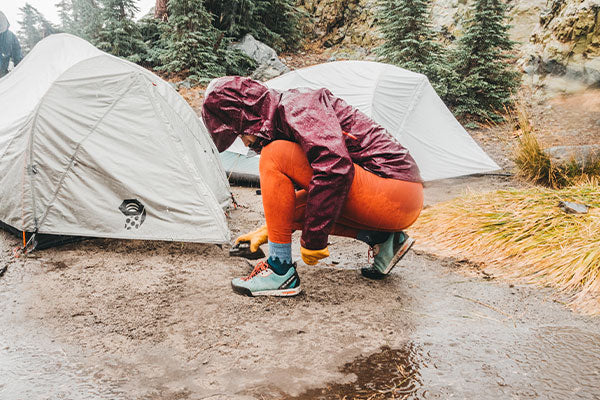5-ish Reasons You Need Our Merino Wool Socks in Your Life

Claiming socks can be life changing feels a little aggressive, but comfortable, dry feet are a firm foundation to enlightenment, when you’re honest with yourself.
Maybe it’s age – we adore the meme professing the older you get the more you value receiving socks as a gift – or maybe it’s experience, the latter sounding far more appealing. You can grow old appreciating socks, but you grow wise appreciating Merino Wool socks.
And if there’s something we feel comfortable with, it’s experience with the best wool socks. Most people don’t spend time meditating on the topic, but if we’re all being honest here, we do.

So, if you’re looking for some snippets to replace that daily affirmation deck of cards at your desk from your stocking last year, we get it, this list is aimed at providing some key and practical reasons to change your life through socks. Our socks, specifically.
1 — No One Likes the Word Moist
If it’s not cake, or cat food, it’s best you keep that term behind the gums. If you insist using vocabulary like fingernails across the chalkboard, at the very least you don’t need to enter someone’s home and announce how moist your feet are. Gross.
Merino Wool can’t stop your feet from sweating (well, kinda, but we’ll get to that). Some feet just sweat, most puddles or streams are wet, and sometimes rain cannot be avoided.

What makes Merino one of the best materials to make moisture wicking socks because of its moisture management properties. Wool can absorb a lot of water before it'll feel wet, and for the most part that’s what it’s doing. It does dry quickly, but it gets moisture off your feet better than other fibers used in knitting socks. Cotton soaks up water too, but that's pretty much all it does. Wool actively releases moisture as well as absorbs it.
Think of it like this, if you kick your boots off and walk across a concrete floor, the little sweat footprints you leave behind would be less with wool.
2 — Smell Ya' Later
Again, as with sweat the human body will often do its own thing, body odor is body odor, and soaps, scrubs, and essential oils aren’t our expertise. We do know that wool naturally repels stink. Better said, it absorbs odor too, or even better said its art of maintaining moisture keeps bacteria from causing problems.

Odor-resistance is something we’ve put to the test. Ric Cabot (started the Darn Tough Vermont brand) for years has claimed he will go 30 days in a new style of our socks to test them out. During Vermont’s COVID lockdown, one of our own did 40 days. Neither are really a suggested standard, but chances are you know someone that packs way more socks than they need for a trip. Maybe that person is you.
Personal hygiene will play a role, and if you start with shoes you wore without socks all summer … there’s more going on in those shoes than we need to discuss. It’s not an absolute, but the odds of wearing the same pair of Merino Wool socks for multiple straight days without a wash, while not offending anyone, are in your favor. They really are the best socks for stinky feet.
For what it’s worth, to really take a shot at the title, you should shower daily, or at least wash your feet. Not a bad idea to take them off at night, and alternate feet during wear. Some feel that turning them inside out overnight also helps. Makes sense.
3a — It Feels Good
Merino Wool could be one of the most misunderstood yarns on the planet. The yarn we use is nothing like ball of yarn in the knitting basket. You would most likely call what we use a thread if you were looking at a single strand off the cone.

Coming from the Merino sheep breed, Merino wool fibers are fine, and when knitted vs woven, are also super soft. Kind of a big step to compare it to the first time you felt cashmere, but we have seen eyes light up (re: enlightenment) when someone pulls on one of our socks for the first time, especially if they were expecting an itch when wearing wool. We know that kind of wool. We own big sweaters, too, and once owned turtlenecks.

What we use is not itchy and feels silky smooth. If it’s a cushion sock – terry loops create cushion - it feels even softer. When it’s one of our twisted yarn socks, which creates an even loftier knit, it’s pillow soft.
Bottom line, Merino Wool socks feel great wash after wash after wash.
3b – It Feels Good, Differently

It would be easy to assume, since Merino grows on sheep, that it’s not only sustainable from a renewable resource perspective, but as a natural growing occurrence that it returns to the earth much the same. Not wildly incorrect, but to be real the steps it takes to get from the mountainside herd to your sock is not a celebrated environmental process. It would feel cliché to say we are doing our best, rather, we hold ourselves accountable to be better.
For years now we’ve prioritized the use of Merino Wool from sheep not been exposed to the practice of mulesing. We are well on our way to supporting 100 percent use of Responsible Wool Standard (RWS)-certified wool, a voluntary standard with strict guidelines to protect animal welfare and adhere to progressive, sustainable farm and land management practices while maintaining traceability throughout the entire supply chain.

Merino is a natural fiber and the process to get it to market improves, as does our personal accountability. All this said, the way we knit Merino Wool with our two other yarns of Nylon and Lycra® creates an incredibly durable product. So much so, we guarantee them for life.
If you consider some of the information we’ve covered about multiple-day use, moisture wicking, etc., you could probably have 3-4 pairs of socks and wear them for 10 or so years before questioning their replacement. During that time, you can reduce your need to wash them as well.
They feel good on, they can feel good in your soul.
4a – Yes, Merino Wool is Great for Cold Days

A natural insulator, wool is super good when it’s cold. But most people associate wool and cold weather as the ultimate combination already.
As we said, it’s going to keep moisture off your skin as your body heat increases, and when temps drop alongside your body temperature, managing that moisture can honestly save your life, depending on the situation.
This is where wool dominates materials like cotton. Not only will it keep moisture off your skin, the fiber has a natural crimp that creates pockets of insulation.
You stay dry, you stay warm – a great tandem and a natural benefit of wool.
4b – But Also Yes, Merino Wool is Great for Hot Days

This is what seems to blow people’s minds. A pair of Merino Wool socks on a 90-degree day with humidity at a ridiculous percentage – barring just being nude at a swimming hole – is a great idea.
Here’s why Merino makes temperature regulating socks. Like moisture, wool absorbs and releases heat. It’s breathable. It insulates, but since it transfers heat alongside moisture, the only thing melting will be your face when you realize how moderate your feet can feel in wool socks amidst a heatwave.

But are you ready for this … our Mountaineering sock represents the heaviest weight, full cushion sock we knit, and it also contains the highest wool content (alongside Nylon and Lycra®). On first glance, it might be the last sock you’d think of putting on during the summer; no one wants smelly, sweaty feet. But with so much wool, and so many benefits, they work great all year, and have for over 100 years.
To support that claim, we were intensely proud when Green Mountain Club Executive Director Mike Debonis hiked the Long Trail in 2017, with gear that would have been available in 1917 (or as much as he could manage). He made his own backpack basket for the trek, just to give you an idea of the dedication. Our Over-the-Calf Mountaineering socks were apparently the closest he could find to time-period hosiery and if you’ve worn them, you know how magical they really are.
Thick? Yes. Comfortable? Absolutely. Can you wear them 40 days in a row? Correct.
5 – A Blister Resistor
Dang, using “blister resistor” is a sure sign we’re slipping, but you know what doesn’t slip?
Our socks. They're great socks to prevent blisters for a few reasons.
Now, some of that is purely our superior high-density knitting technique, and dedication. A great fitting sock helps feet stay blister free.
But combined with the moisture wicking properties of Merino Wool, it keeps things from getting rowdy in your hiking boots or running shoes. Sweat aside, the ultimate test of this comes when your foot is fully submerged.

Outside of waders, all the Gore-Tex® on the planet cannot really defend against crossing a knee-deep body of water. Your feet will be wet. The combination of moisture absorbed, and a performance-fitting knit sock is something you have to feel to believe. Your footwear might get sloppy, but our socks will hang tough.
OK, maybe that last line we roll our eyes at more than the rest. However, it softens the use of “life changing” regarding our socks.







